Is your organic garden being overrun with pests? Here’s how to get rid of bugs on plants in your garden- including the top 8 common garden pests!
I still remember the first time I ever encountered a squash bug. I was relatively new to gardening and for years had coasted along with no problems. Then one day I went out and one of my zucchini plants was on the ground. Wilted and dying. Naive me thought it was the summer heat- but by the end of the night 2 more plants were down. And those stink bugs in the garden were identified as squash bugs.
This site contains affiliate links. If you make a purchase using one of these links, I may earn a commission. Please see my disclosure page for more information about cookies collected and our privacy policy.
Luckily natural garden pest control can be utilized relatively quickly and easily.
So whether it is squash bugs or flea beetles that you are fighting- let’s get these common garden pests out of your garden!
Get Rid of These 8 Common Garden Pests- Naturally!
So how do you get rid of bugs on your plants naturally? Well that depends on what garden pest we are talking about.
In general you can employ some of the following methods:
- Hand picking
- Essential Oils
- Companion Planting
- Beneficial Insects
Want to know specifically what will work to get rid of the pests in your garden? Here’s the run down on 8 specific pests and how to get rid of them in your garden.
Aphids
Aphids are a common garden pest that can cause big problems. They target a lot of different crops and can cause viral disease in your garden as well. Luckily, aphids are fairly easy to control organically!
Aphids have a number of natural predators, such as lady bugs, lacewings, and hoverfly. You can also companion plant with onions or other alliums to help repel aphids.
But if you have a large infestation to deal with you can use the following organic pest controls:
- Neem Oil– diluted and sprayed on your plants to repel aphids
- Soap and water- dilute a bit of dish soap and water to spray on infected plants
- Mix a few drops of peppermint, clove and rosemary essential oils in a spray bottle full of water and spray on affected plants
I’ll be honest- we get aphids on our tomatoes every year and I have never once treated them. If your plants are strong and healthy, your soil is healthy, and you’re attracting beneficials you should get a good balance and not have to worry.
Check out my article on how to use companion planting to get rid of aphids in your garden for more tips on getting rid of this garden pest.
Pick up a copy of my Companion Planting Guide and Binder to help you design the perfect garden beds with companion planting in mind. Everything you need to know about companion planting in an easy to read format so you can start companion planting sooner!
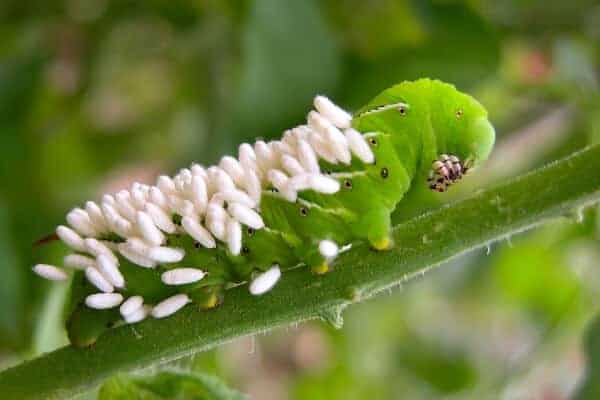
The braconid wasp is a parasite of the Tomato Hornworm, a common garden pest
Hornworms
These common garden pests are fat green worms that are great at camouflage! I tend to see their droppings before I notice the damage. And then it takes forever to find the little buggers because they are so well hidden!
And while you can control hornworms with organic biological control such as Bacillus thuringiensis, the best way to control them is through good soil preparation, hand-picking, and attracting beneficial insects.
The Braconid wasp is a beneficial insect that can help you control hornworms in your garden. This wasp lays it’s eggs on worm and when they hatch the larvae will feed on the hornworm. So if you come across a hornworm covered in white eggs- leave it! And allow more beneficials to be born in your garden.
Use companion planting to help attract these wasps. Planting herbs such as basil, cilantro, thyme, rosemary and oregano in your tomato beds will attract the braconid wasp and reduce the number of hornworms in your garden!
Related Reading: The Best Tomato Companion Plants for Your Garden
Flea Beetles
Flea beetles are tiny black beetles that look, not surprisingly, like fleas! These common garden pests tend to target crops like eggplant and brassicas, though they can also do a number on tomato, pepper, and other nightshade seedlings.
So if you see little black bugs on your plants, it’s likely that you’re dealing with flea beetles.
Most of the time if you can get your crops past the seedling stage they will be able to fend off the flea beetles. In our garden, eggplant and wonderberries are the hardest hit, and if I don’t treat them right away the seedlings are all but destroyed by the flea beetles.
My number one defense against flea beetles is diatomaceous earth. I keep the plants heavily dusted with DE from planting time until they are starting to flower. Once they start to flower they are usually big enough that the flea beetles don’t bother them anymore and I don’t want to risk harming any pollinators with DE.
Be sure to reapply after heavy dew and rain!
Related Reading: How to Get Rid of Spider Mites Naturally!
Potato Beetles
The potato beetle- and it’s larva- can destroy your potato plants very quickly. And while this garden pest does favor potatoes, they will also feed on other nightshades such as tomatoes and eggplant. A couple of the ways you can control this garden pest are:
- Companion plant your potatoes and eggplant with beans to help repel the beetles
- Hand pick off any eggs, larva, and adult beetles you see. Chickens love them!
- Use row covers in areas that are particularly hard hit
- Use heavy mulch a the base of the plants to make it harder for the beetles to find the plants
In our garden we rely mostly on handpicking, it’s not the kids’ favorite chore- but one we do every evening during potato growing season.
Related Reading: The Best Essential Oils for the Garden
Cabbage Worms
Cabbage worms are one of my least favorite garden pests. I can’t tell you how I hate to steam a fresh head of broccoli and find the hidden dead worms in the pot!
The number one way I keep the cabbage worms away from my plants is by planting as early as possible. If I plant early then I can get a good harvest before many of the worms move in. Other control options are:
- Companion plant with herbs such as tansy, oregano, and thyme to attract beneficial insects
- Use floating row covers to prevent butterflies from laying their eggs on your crops
- Sprinkle the plants with cornmeal
- Spray with tansy oil
Sometimes I just give up and we bring the plant stalks inside and let the kids watch the worms turn into butterflies! If you can’t beat them- learn from them!
My Yearly Gardening Planner is perfect for keeping track of everything- from your seed inventory to planting dates to disease and pest problems. Start planning your best garden today!
Squash Bugs
Ahhh…the dreaded squash bug. I am not sure there is a more dreaded garden pest. These guys have the ability to take a big healthy plant down in a matter of hours. I even wrote a whole post on how I control this common garden pest. The things to remember most when it comes to getting rid of squash bugs are:
- Pick off the adults and eggs every. single. day.
- Use diatomaceous earth on the base of the plant and undersides of the leaves to help control the nymphs
- Companion plant with nasturtiums to help deter squash bugs
- Plant flowers and herbs to help attract the beneficial Tachanid fly
And just plant a lot of squash so that it will take awhile to eat through them all. Alternately, only plant squash every other year so that the bugs might move on during the off year.
Mexican Bean Beetles
Mexican bean beetles are garden pests that target all types of beans- and I occasionally find them on our pumpkin plants as well. They are similar in size and appearance to a large ladybug- only more orangish-copper in color. The larva are odd-looking- soft bodies that are bright yellow with black spines along their backs. They will eat through your beans leaving a lacy appearance to the leaves.
Damage to plants is most severe in the hot summer months of July and August, so planting early maturing varieties can help you get a harvest before the pests move in. Similar to aphids, a mixture of soap or neem oil sprayed on the plants will help with infestation.
Companion planting with marigolds will offer some protection, as will interplanting with potatoes- beans will help deter the potato beetle and the potatoes will help deter the bean beetles. It’s win-win!
And don’t forget to add picking bean beetles off the plants to your daily chore list! I keep a jug of soapy water in the garden for just this task!
Cucumber Beetles
Cucumber beetles are small yellow and black beetles that will primarily target your cucurbit – cucumbers, squash, and melons. While the insect itself can cause damage, the higher risk is the transmission of bacterial wilt to your plants. You can try to hand-pick these guys- but they are quick and tend to fly away before you can catch them! The best lines of defense against cucumber beetles are:
- Delaying your planting. The highest damage is usually in the early summer months. So by delaying your first crops by a couple of weeks to a month, you will miss the main first attack of these insects.
- Mulching with hay, straw, or plastic to reduce the number of eggs laid in the soil near the plants.
- Use floating row covers
- Kaolin clay has been used to deter the bugs from feeding and laying eggs on your plants.
You can read more about how to control cucumber beetles on my article How to Control Cucumber Beetles Naturally.
Additional Readings: 16 Ways to Use Companion Planting to Control Pests Naturally or The Complete Guide to Companion Planting in the Organic Garden
With a little hard work and a few organic ingredients you can get all those common garden pests out of your garden and off your veggies! What is the biggest garden pest you deal with every year?

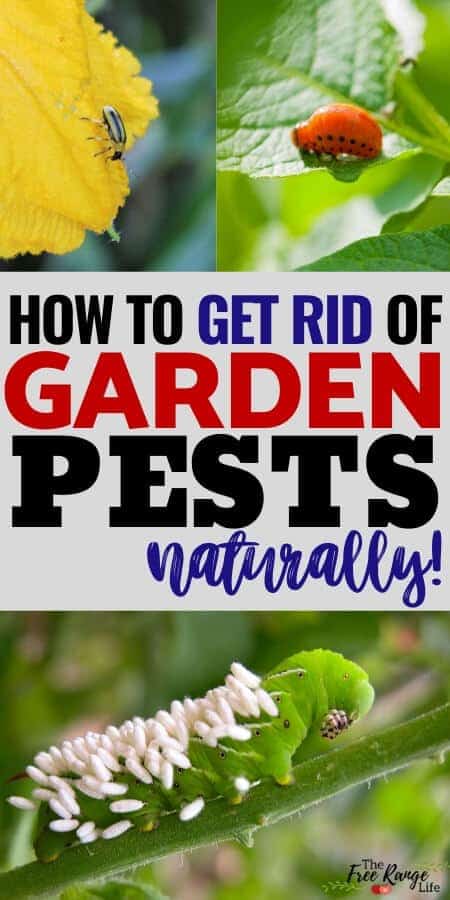
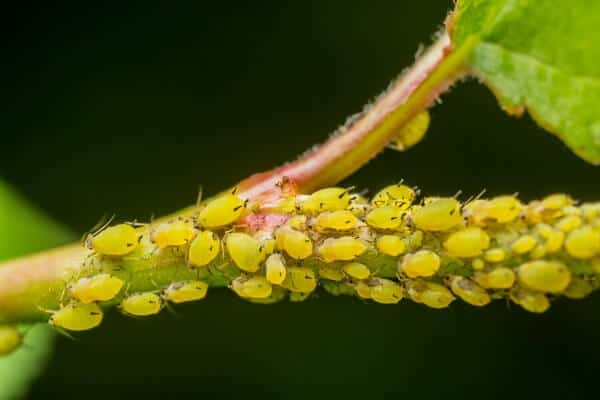
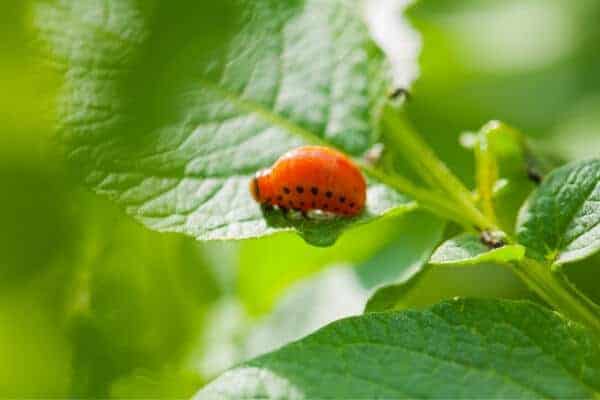
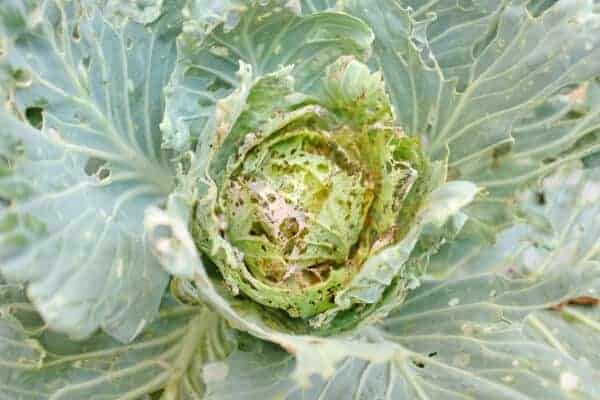
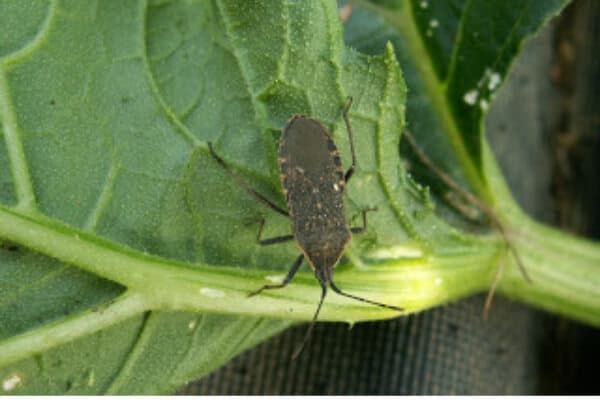
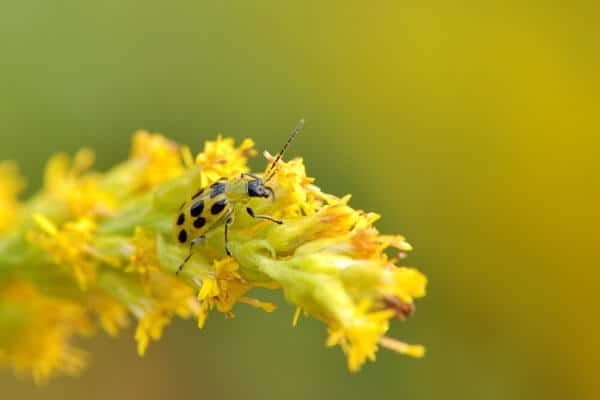


I control Orange Citrus Bugs by knocking them off the tree into a saucepan of boiling water, I then boil them on the cooker ,strain and spray the liquid onto my citrus trees, it works for around two years before a need for a respray.
that is sounding so cruel even on hearing
I didn’t know getting rid of bed bugs is so complicated! Thank you for these detailed tips!
What do you do about grasshoppers! I have thousands.